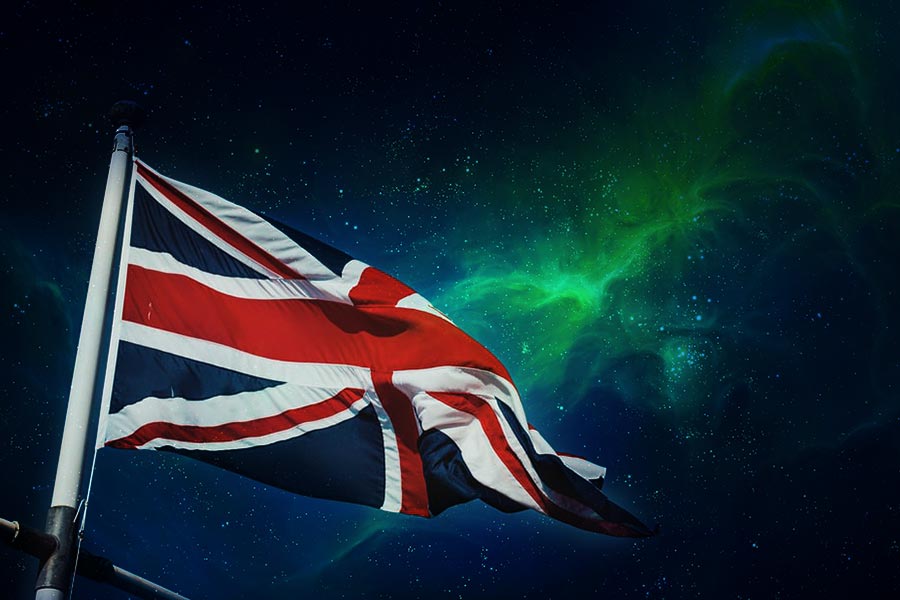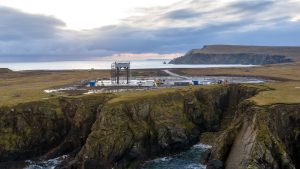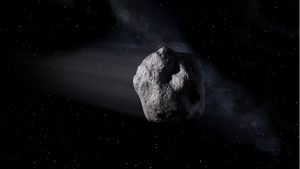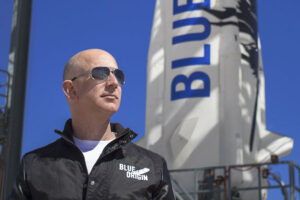British Space Movies: The UK Take on the Great Beyond
31st Oct 2022
British space movies have their own unique place in the world of cinema. Often quirky, often artistic, British directors and actors have been responsible for more than their fair share of great films over the years.
Historically, you might think of big Hollywood productions when someone raises the topic of films in space, or science fiction movies in general, but there have been some films sprouting from the UK too. Some of these films you may not have even known had their roots in Britain.
Moon (2009)
With a movie set in space, it can be hard to pinpoint where it has been made, for obvious reasons. It’s not like the streets of London are visible, in spite of the fact that Moon was made at Shepperton Studios, Surrey.
You could be forgiven for thinking this was a US production, with the incredible solo performance of Sam Rockwell proving to be a driving force behind the movie.
This dark independent science fiction film was actually the directorial debut of Duncan Jones, who many will know to be the son of David Bowie.
Moon follows protagonist Sam Bell manning a station on the moon mining helium-3, with just a robot for company. A shocking revelation about the nature of the character’s mission leads to a personal crisis, and Moon evolves into a moving and touching piece of cinema, led by Rockwell’s virtuoso performance. The film is also notable for its expert score by Clint Mansell.
Moon may have been something of an underground hit, but it is undeniably critically acclaimed and won Jones the BAFTA for Outstanding Debut by a British Writer, Director or Producer.
Sunshine (2007)
When you think of British film directors working today, it won’t be long until your brain goes to the work of Danny Boyle. Sunshine, however, is not one of his biggest hits.
The British production centres around a story written by Alex Garland, which tells of a group of astronauts who set out to reignite the Sun which has been discovered to be “dying”. Set in 2057, the movie follows the close relationships of the crew, and the perceived perils of travelling together in this close proximity. Cillian Murphy, Chris Evans, Michelle Yeo, and Benedict Wong are among the ensemble cast.
Danny Boyle, in search of authenticity in the emotions and feeling of the characters, asked the actors to live together during the making of the film, while learning about their imagined roles on the spacecraft, as a take on method acting.
The movie was nominated for Best British Film at the Empire awards, as well as receiving some other independent British movie accolades, but compared to a lot of Boyle’s work the reception was lukewarm. That said, it is an interesting and provocative watch, especially because of the way the relationship between the crew evolves.
The Martian (2015)
The inclusion of The Martian on this list is not without controversy. The film was a co-production with the involvement of US and British production companies. Ridley Scott’s production company, Scott Free Productions, was heavily involved, and he also directed the film. The fact that the film was directed by an Englishman also helps it to creep onto our list, in spite of having a very Hollywood feel to it.
Large parts of the movie were shot in Hungary, and Wadi Rum in Jordan was also used for its Martian-looking landscapes.
The film follows the Ares III crew on mars, and specifically botanist/astronaut Mark Watney who becomes stranded on Mars after a severe dust storm leads to him being struck by debris and failing to make it back to the ship with his crew mates. Watney has to improvise to survive as the crew, now departed to go back to Earth, eventually discover that he is alive, and hatch a plan to retrieve their friend.
The Martian was very positively reviewed, and, along with author Andy Weir (whose book provides the source material), has been praised for its scientific accuracy and explanations. A triumph among British space movies with a lot of help from America.
Outland (1981)
This 1980s science fiction movie set on Io, Jupiter’s moon, is heavily rooted in Westerns, with a plot that is similar to that of High Noon.
The movie stars Sean Connery as Marshal O’Neil, assigned to a mining colony on the moon, when he comes across the use of an illegal drug. When O’Neil starts to investigate he finds that he has been marked, and turned into the number one target…
The movie was filmed at the iconic Pinewood Studios in the UK, with a budget of around $12 million. Its reviews were decent, but it didn’t set the world alight, and has largely been forgotten about, perhaps unfairly. Yes, the movie is a remake of High Noon, set in space, but it is done relatively well and is certainly a worthwhile watch.
Outland has been rumoured to be in the works once again, with a remake supposedly commissioned.
The Hitchhiker’s Guide to the Galaxy (2005)
The Hitchhiker’s Guide to the Galaxy can be described as quintessentially British. A series of stories written by Douglas Adams was turned into a radio series, then a television series, and then, in 2005 it was adapted for the big screen.
The comedy production boasts a stellar ensemble cast, with Martin Freeman, Sam Rockwell, Mos Def, Zooey Deschanel, Bill Nighy, and John Malkovich among the actors to appear, and voice acting from Stephen Fry as the narrator as well as Helen Mirren, Bill Bailey and Alan Rickman.
Sadly, Douglas Adams died long before the release of the film but talk of a cinematic production had been rumbling on since as early as the 1970s. In an interview with Slashdot, producer Robbie Stamp stated that “Douglas himself is on record as saying that as far as he was concerned the only character who had to be British, indeed English, was Arthur Dent.”
Adams got his wish as Martin Freeman plays the grumpy Englishman, who is whisked away from his home in Britain by his friend Ford Prefect, who turns out to be not just an alien, but the writer of a new space travel book, “The Hitchhiker’s Guide to the Galaxy.” Dent may be saved, but chaos ensues with a cast of characters including the clinically depressed robot, Marvin the Paranoid Android.
The Hitchhiker’s Guide to the Galaxy is much beloved by generations of Brits, and attracted an incredible cast for the film by Garth Jennings, performing well at the box office. When it comes to British space movies, there’s nothing else like it.
Dr. Who and the Daleks (1965)
Another British institution that was turned into a movie. The Daleks are known the world over, and have even been referenced and parodied in American comedies Community and South Park.
In this 1965 film, The Doctor (played by Peter Cushing at this time) is transported to the Daleks’ home planet, and gets caught up in the war between the Daleks and the peaceful and placid Thals, a humanoid race living on the planet.
The film got a US release, but did very poorly. At the time, The Doctor was a very British phenomenon, and has since gone on to achieve a cult following elsewhere in the world. In the UK, however, it was a successful cinema release and has been shown regularly on television through the years, along with the hundreds of episodes of Dr. Who, and multiple movies in the franchise.
Daleks’ Invasion Earth 2150 A.D. would follow in 1966, but as the name suggests, is not set in space.
Thunderbirds Are Go (1966)
Thunderbirds have a unique place on the list owing to the fact that the movie, like the TV show, was made primarily using puppets and models in a unique form of animation. Known in pretty much every household in the UK, Thunderbirds had a resurgence with another animated film released in 2004.
The 1966 version was directed by David Lane and follows the crew of spacecraft Zero-X on a mission to Mars, which has a malfunction on re-entry and International Rescue and the Thunderbird machines have to come to the rescue and activate the escape pod.
The filming and special effects were largely done at Century 21’s studios in Slough. This was the first film ever to use a form of video assist, called Add-a-Vision. The movie’s special effects were a long and arduous process to complete, but created the end result we know today.
Spaceways (1953)
Though Britain’s relationship with science fiction films can be traced back over 100 years, Spaceways is one of the earliest examples of British space movies.
The film was released way back in 1953, and was based on a radio play by Charles Eric Maine.
The film follows Dr. Stephen Mitchell who is part of a space programme with ambitions to orbit Earth, but as it pans out, the movie’s true plot is that of a murder mystery, as his unfaithful wife and her lover disappear.
The inevitable malfunction leaves the spacecraft spiralling out of control until it is saved, but the scientific aspects of this film very much take a backseat to marital drama.
Interestingly, the movie was made by Hammer Film Productions, most famous for the “Hammer Horror” movies that have garnered cult status over the years.
Spaceways didn’t do particularly well, but it is worthy of inclusion as one of the earliest examples of a British production company taking on a film set in space.
Lifeforce (1985)
This is definitely one of the stranger films to make the list.
Lifeforce was made in Britain over the course of 17 weeks in the early 1980s Directed by Tobe Hooper, the influential horror director, the film was a flop. However, it has gone on to receive some form of cult status, with numerous reviewers speaking favourably about the movie. “The movie is slyer and smarter than people give it credit for, and absolutely gorgeous-looking” says Drew Taylor for IndieWire.
Lifeforce was based on a novel by Colin Wilson entitled The Space Vampires and shows what happens when three humanoids that have been kept in suspended animation come to Earth having been discovered in an alien spaceship by European astronauts.
The movie was initially to be called The Space Vampires but this was eventually scrapped for the Lifeforce title. If nothing else, it is worth watching for its absurdity. Leonard Maltin the film critic said Lifeforce was ‘ridiculous, but so bizarre, it’s fascinating’.
Notable Mentions and Films With British Involvement
There are certain films that definitely could’ve been included under a less stringent definition of British space movies, not least, 2001: A Space Odyssey. Directed by Stanley Kubrick, the movie was largely made in the UK due to tax breaks and the fact that Kubrick himself lived in the south of England.
Of course, 2001 is one of science fiction’s all-time greats, offering a foreboding and fascinating preview of an age of space travel that still holds up today, over 50 years after the film’s release (and over 20 years since we reached 2001).
Ridley Scott’s movies are also worthy of mention as being at least in-part British. Scott Free films was heavily involved in the production of some recent space films including Prometheus and Alien: Covenant. These films utilised the facilities at Shepperton Studios and Pinewood Studios.
Another movie the British could claim credit for is the 2013 award-magnet Gravity, which was produced by Heydey Films, a British company, and partially shot at Pinewood and Shepperton like so many of the other movies to make the list. Indeed, director Alfonso Cuarón could be considered an honorary Brit having lived in London since the year 2000, though that may just be stretching it.
The British impact on space-centred science fiction is sometimes humorous, sometimes strange, and sometimes revolutionary, but it is rarely boring, as this collection of movies goes to show.






Thank you for your comment! It will be visible on the site after moderation.